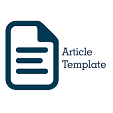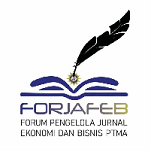PENGGUNAAN APLIKASI ATLAS TERHADAP KINERJA AUDITOR
Abstract
The purpose of this study was to determine whether using ATLAS has an effect on auditor performance as measured by work quality, work quantity, and timeliness with several indicators. The methodology used is qualitative based on observations and interviews with senior auditors at KAP KKSP. The results of this study are ATLAS affects the quality of work on indicators of misstatement detection, compatibility with applicable general standards, and compliance with SOPs. On work quantity, ATLAS affects the indicator of the amount of work that can be completed with targets within a certain time but has no effect on the ability to utilize facilities and infrastructure where ATLAS is positioned as a tool in accommodating audit procedures. Finally, ATLAS affects the timeliness of auditors in completing their work. The limitation of this research is that it is only based on one KAP and is only limited to the offline version of ATLAS.
Keywords
Full Text:
PDFReferences
D’Ambra, J., Wilson, C. S., & Akter, S. (2013). Application of the task-technology fit model to structure and evaluate the adoption of E-books by academics. Journal of the American Society for Information Science and Technology, 64(1), 48–64. https://doi.org/10.1002/asi.22757
Darmayasa, I. N., & Putrayasa, I. M. A. (2019). Detecting Fraud Through Audit Tool and Linked Archive System Working Paper. 354(iCASTSS), 29–34. https://doi.org/10.2991/icastss-19.2019.7
Darono, A. (2010). Teknik Audit Berbantuan Komputer: Menelaah Kembali Kedudukan dan Perannya. Seminar Sistem Informasi Indonesia (SESINDO2010), January 2010, 1–8.
Dejan, J. (2009). Implementation of Computer Assisted Audit Techniques in Application Controls Testing. Journal of Management Information Systems, 4, 009–012.
Goldwasser. (1993). The Plaintiffs’ Bar Discusses Auditor Performance. Journal of CPA New York State Society of Certified Public Accountants, 63(10), 48–53.
Goodhue, D. L., & Thompson, R. L. (1995). Task-technology fit and individual performance. MIS Quarterly: Management Information Systems, 19(2), 213–233. https://doi.org/10.2307/249689
Haniifah, M. N., & Pramudyastuti, O. L. (2021). Analisis Efektivitas Audit Tool and Linked Archive System Dalam Menunjang Proses Audit Laporan Keuangan. Maneksi, 10(2), 169–177.
Hermawan, A. (2009). Penelitian Bisnis: Paradigma Kuantitatif. Grasindo.
Hidayati, N. (2019, August 13). PPPK Mengajak Dosen Audit Mengenalkan ATLAS Kepada Mahasiswa. PPPK Kemenkeu. https://pppk.kemenkeu.go.id/in/post/pppk-mengajak-dosen-audit-mengenalkan-atlas-kepada-mahasiswa
Kristanto, M. (2021). KESIAPAN AUDITOR DALAM PENGGUNAAN DATA DIGITAL DAN BIG DATA.
Kusumawati, A. D. (2012). Persepsi Siswa Terhadap Usaha Guru Dalam Memotivasi Berwirausaha Siswa Pada Mata Diklat Pengelolaan Usaha Boga (UB) Di SMKN 3 Wonosari.
Mangkunegara, D. A. A. A. P. (2013). Manajemen Sumber Daya Manusia Perusahaan. Pt Remaja Rosdakarya Bandung.
Riani, F. (2013). Pengaruh Pengetahuan Audit, Akuntabilitas dan Independensi Terhadap Kualitas Hasil Kerja Auditor(Studi Empiris pada Auditor BPK-RI Perwakilan Wilayah Sumbar). Jurnal Akuntansi, 1, 2–22.
Said, S. N. R. (2020). PENGARUH MOTIVASI TERHADAP KINERJA AUDITOR (Studi Empiris Pada Inspektorat Provinsi Sulawesi Selatan). Jurnal Akuntansi STIE Muhammadiyah Palopo, 6(2), 12–26. https://doi.org/10.35906/ja001.v6i2.558
Salsabila, & Prayudiawan. (2011). Pengaruh Akuntabilitas, Pengetahuan Audit dan Gender Terhadap Kualitas Hasil Kerja Auditor Internal (Studi Empiris Pada Inspektorat Wilayah Provinsi DKI Jakarta). Jurnal Telaah & Riset Akuntansi, 4(1), 151–175.
Sangkala, M., Hamzah, H., & Ismail, A. M. (2021). Peningkatan Kinerja Auditor Berbasis Teknologi Informasi. Seminar Nasional Hasil Penelitian 2021, 2550–2560.
Sugiyono. (2010). Metode Penelitian Pendidikan Pendekatan Kuantitatif, kualitatif, dan R&D. Alfabeta.
Suparsada, N. P. Y. D., & Putri, I. A. D. (2017). Pengaruh Profitabilitas, Reputasi Auditor, Ukuran Perusahaan, Dan Kepemilikan Institusional Terhadap Audit Delay Pada Perusahaan Manufaktur. E-Jurnal Akuntansi Universitas Udayana, 18, 60–87.
Wirawan. (2009). Evaluasi Kinerja Sumber Daya Manusia Teori Aplikasi dan Penelitian. Salemba Empat.
Wooten, T. G. (2003). It is Impossible to Know The Number of Poor-Quality Audits that simply go undetected and unpublicized. The CPA Journal, 48–51.
DOI: https://doi.org/10.32502/jab.v8i1.5965
Refbacks
- There are currently no refbacks.
Program Studi Akuntansi Fakultas Ekonomi dan Bisnis, Universitas Muhammadiyah Palembang
Jl. Jenderal A. Yani 13 Ulu, Seberang Ulu II, Palembang (30263), Indonesia.
Indexed by :














.jpg)


